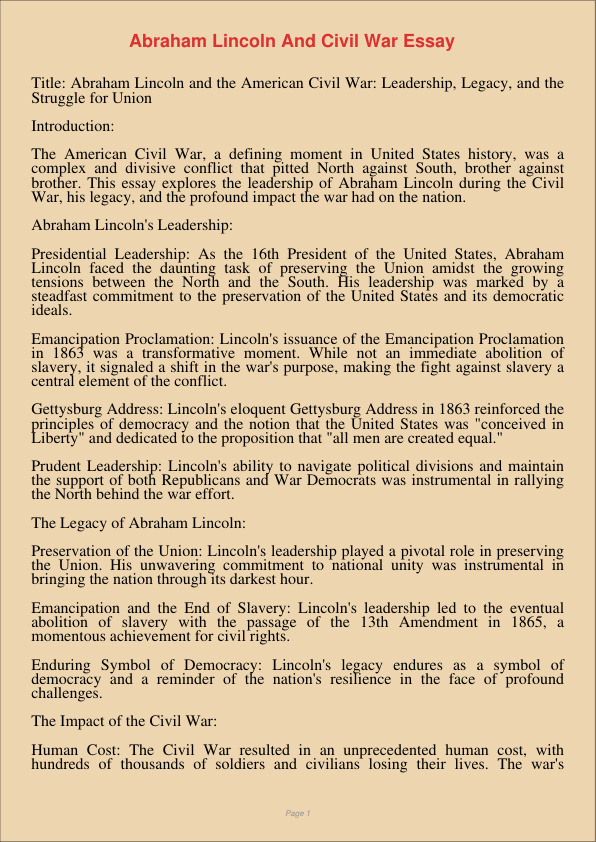Abraham Lincoln And Civil War Essay
Jan 7, 2024
civil war essay
abraham lincoln
History
Business

Title: Abraham Lincoln and the American Civil War: Leadership, Legacy, and the Struggle for Union
Introduction:
The American Civil War, a defining moment in United States history, was a complex and divisive conflict that pitted North against South, brother against brother. This essay explores the leadership of Abraham Lincoln during the Civil War, his legacy, and the profound impact the war had on the nation.
Abraham Lincoln’s Leadership:
Presidential Leadership: As the 16th President of the United States, Abraham Lincoln faced the daunting task of preserving the Union amidst the growing tensions between the North and the South. His leadership was marked by a steadfast commitment to the preservation of the United States and its democratic ideals.
Emancipation Proclamation: Lincoln’s issuance of the Emancipation Proclamation in 1863 was a transformative moment. While not an immediate abolition of slavery, it signaled a shift in the war’s purpose, making the fight against slavery a central element of the conflict.
Gettysburg Address: Lincoln’s eloquent Gettysburg Address in 1863 reinforced the principles of democracy and the notion that the United States was “conceived in Liberty” and dedicated to the proposition that “all men are created equal.”
Prudent Leadership: Lincoln’s ability to navigate political divisions and maintain the support of both Republicans and War Democrats was instrumental in rallying the North behind the war effort.
The Legacy of Abraham Lincoln:
Preservation of the Union: Lincoln’s leadership played a pivotal role in preserving the Union. His unwavering commitment to national unity was instrumental in bringing the nation through its darkest hour.
Emancipation and the End of Slavery: Lincoln’s leadership led to the eventual abolition of slavery with the passage of the 13th Amendment in 1865, a momentous achievement for civil rights.
Enduring Symbol of Democracy: Lincoln’s legacy endures as a symbol of democracy and a reminder of the nation’s resilience in the face of profound challenges.
The Impact of the Civil War:
Human Cost: The Civil War resulted in an unprecedented human cost, with hundreds of thousands of soldiers and civilians losing their lives. The war’s brutality and devastation left deep scars on the nation.
Reconstruction Era: The post-war Reconstruction era sought to address the social, political, and economic challenges facing the country. It led to the ratification of the 14th and 15th Amendments, granting civil rights and voting rights to African Americans.
Changed Nation: The Civil War fundamentally changed the United States. It marked the end of the agrarian South’s dominance and accelerated the country’s shift toward an industrialized, united nation.
Conclusion:
The American Civil War, under the leadership of Abraham Lincoln, was a pivotal moment in U.S. history. Lincoln’s unwavering commitment to preserving the Union, his role in the abolition of slavery, and his enduring legacy as a symbol of democracy continue to shape the nation’s identity. The war’s profound impact, both in terms of human cost and its reshaping of the nation, serves as a reminder of the importance of preserving the principles of democracy and equality that Abraham Lincoln held dear.